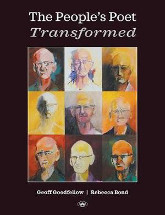The people's poet, transformed by Geoff Goodfellow and Rebecca Bond

Wakefield Press, 2018. ISBN 9781743055755
(Age: Secondary) Recommended.
Designed for use by teachers, this collection of Goodfellow's poems
is supplemented by teacher Rebecca Bond's ideas for how they could
be used in the classroom as texts for transformation tasks as
proposed by the Australian Curriculum for English. Bond says that it
is important to encourage students to write and create texts that
have meaning for them - the tasks encourage students to reinterpret
the poems in their own way, giving voice to their own ideas and
experiences.
Whilst many of Goodfellow's poems may relate to an earlier
generation, the poems are very accessible; the themes are ones that
continue to have relevance today - themes of domestic violence,
adolescent independence, addiction, male aggression, lost love,
smoking and cancer, etc. Each poem has a voice or character that
people can understand and relate to.
An example is the poem 'Crowd control' about Terry the bouncer and
the way he uses violence to assert himself and intimidate. But Terry
is also the guy whose punch put a man into a coma. Bond links it to
today's phenomenon of the 'coward's punch' and makes some
suggestions for a transformation task. If however the suggestions do
not pick up on the issue of 'the king hit' as much as some might
like, I would not see this as a detraction from the book - the
purpose is to provide examples and provoke thought - not provide a
copybook for every teacher. The activities are able to be picked up
and used straight away in the classroom, but they could equally be a
helpful springboard in developing other ideas for transformative
tasks adapted to particular audiences.
Goodfellow provides an example himself where he transforms his
original poem in the confrontational voice of a teenage youth 'Don't
call me lad', to the voice of a rebellious teenage girl in conflict
with her mother, in 'Don't look so glum'; necessitating a change of
focus to the different kinds of contentious issues for a girl.
Bond provides suggestions for a whole range of different kinds of
text types that could be the outcome of a transformation task:
advertising campaign, psychological assessment report, diary, blog,
memoir, song lyric, editorial, poem, newspaper article etc.
The book is most definitely a valuable resource that will be
welcomed by teachers.
Helen Eddy